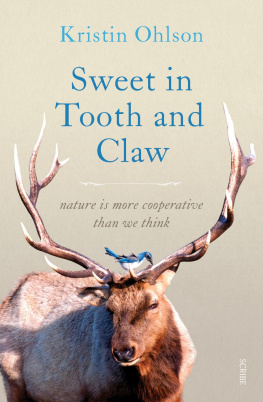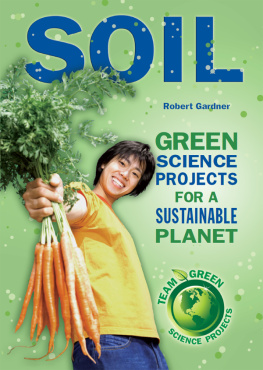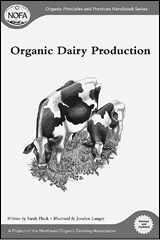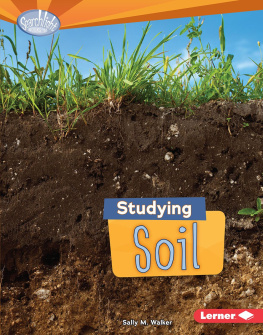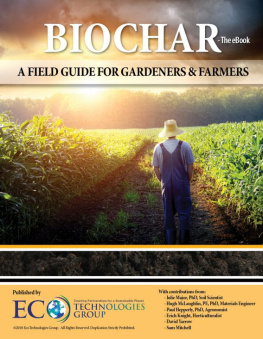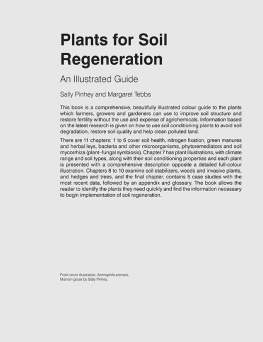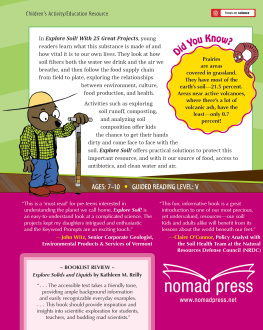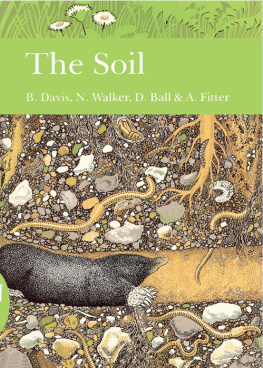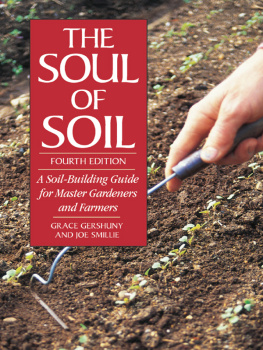Kristin Ohlson - The Soil Will Save Us: How Scientists, Farmers, and Foodies Are Healing the Soil to Save the Planet
Here you can read online Kristin Ohlson - The Soil Will Save Us: How Scientists, Farmers, and Foodies Are Healing the Soil to Save the Planet full text of the book (entire story) in english for free. Download pdf and epub, get meaning, cover and reviews about this ebook. year: 2014, publisher: Potter/Ten Speed/Harmony/Rodale, genre: History. Description of the work, (preface) as well as reviews are available. Best literature library LitArk.com created for fans of good reading and offers a wide selection of genres:
Romance novel
Science fiction
Adventure
Detective
Science
History
Home and family
Prose
Art
Politics
Computer
Non-fiction
Religion
Business
Children
Humor
Choose a favorite category and find really read worthwhile books. Enjoy immersion in the world of imagination, feel the emotions of the characters or learn something new for yourself, make an fascinating discovery.

- Book:The Soil Will Save Us: How Scientists, Farmers, and Foodies Are Healing the Soil to Save the Planet
- Author:
- Publisher:Potter/Ten Speed/Harmony/Rodale
- Genre:
- Year:2014
- Rating:3 / 5
- Favourites:Add to favourites
- Your mark:
- 60
- 1
- 2
- 3
- 4
- 5
The Soil Will Save Us: How Scientists, Farmers, and Foodies Are Healing the Soil to Save the Planet: summary, description and annotation
We offer to read an annotation, description, summary or preface (depends on what the author of the book "The Soil Will Save Us: How Scientists, Farmers, and Foodies Are Healing the Soil to Save the Planet" wrote himself). If you haven't found the necessary information about the book — write in the comments, we will try to find it.
The Soil Will Save Us: How Scientists, Farmers, and Foodies Are Healing the Soil to Save the Planet — read online for free the complete book (whole text) full work
Below is the text of the book, divided by pages. System saving the place of the last page read, allows you to conveniently read the book "The Soil Will Save Us: How Scientists, Farmers, and Foodies Are Healing the Soil to Save the Planet" online for free, without having to search again every time where you left off. Put a bookmark, and you can go to the page where you finished reading at any time.
Font size:
Interval:
Bookmark:


For Holland, Sylvie, and all the inheritors:
Dont be meek!
Even the broken letters
of the heart
spell earth.
DANIEL THOMPSON
I m working in my Cleveland backyard, but idly, dawdling in the sights and smells of fall. A starry canopy of yellow leaves sets off a vivid blue sky. The already fallen, the now-brown leaves, steep in damp, shadowed corners of the yard, and their lapsang-souchong fragrance blows my way. Only the annual chorus of leaf removal mars this otherwise peaceful day. In some yards, blowers roar and raise poofs of dust. In others, people scritch and scratch with their rakes. Im of the scritch-and-scratch persuasion, wielding an aged plastic rake with many broken tines, like bitten-down fingernails on a large green hand.
Normal enough, except that Im not raking my leaves onto a tarp to dump into a recycling bag or to drag to the curb, as my neighbors are. Im raking the leaves on my driveway back to my lawn, hoisting big piles of them onto the muddy turf and then smoothing them with the rake so that they cover the sparse grass with a thin, multicolored coat of autumn. I can imagine my first ex-husband howling, Youre going to kill the grass! No, Id tell him; Im trying to save the grass.
I dont care much about having a good lawnwomen dont, in my experience, and men do. I remember my father in his eighties, surveying the sweep of emerald in back of my parents house and sighing, I just want a perfect lawn before I die. My siblings and I found this both hysterical and poignant. Hadnt he always had a perfect lawn? And since it probably wouldnt get much better, was he doomed to die disappointed?
Ive always viewed my lawn as just the blank space between my flower beds and the oval of soil where I grow vegetablesa spot that benefitted from all-day sun when we bought the house decades ago, but is now shadowed most of the day by oaks and maples and the occasional doomed elm. The grass wasnt especially lush when we moved in, and our tenure further traumatized it. We had a drainage problem after we put in a new concrete driveway and garage: every time it rained, a foot of water backed into the garage. So the yard was torn up as our contractor dug one French drain after another to fix the problem (they didnt), and then another contractor finally tore up everything, driveway included, to route all that storm water out to the sewer.
So the backyard was crushed by heavy equipment off and on for 2 years. If the moon were made of gouged and gridded mud, my view out the kitchen window looked like a moonscape. For Easter during one of those years, I bought my kids a packet of crazy gourd seeds to plant. Vines soon covered the entire yard, blurring the ugliness with their curvy, slightly furred leaves and relieving me of the heartbreak of planning a garden, only to have to summon the bulldozers in again. (Someone ought to try making ethanol from those crazy gourds; Ive never seen such miles of vegetation grow from a tiny handful of seeds.)
We finally planted the lawn and flower beds. The flowers were greata rollicking seasonal carnival of colors and shapesbut the lawn really never had much of a chance. Too much compaction of the soil by the bulldozers. Too many seasons of Slip N Slide. Too much running and jumping, and too much use of stilts and pogo sticks and Big Wheels. Too many basketball games that veered off course. Too much peeing by one dog and digging by another. When the first marriage ended and the second began, a wedding with 100 guests tromped that weary turf for 3 celebratory hours. Then two more dogsthe young black ones that crash through my piles of leaves nowchased each other back and forth across the grass, their nails flinging tufts of grass in their wake until nothing remained but gouge. Also the dearth of water. Even though Cleveland is a high-precipitation city, there are times when you have to water, and honestly, Ive always been stingy with the grass.
So I find myself now with a lawn that is mostly just exposed soil. So hard when its hot that you could break a plate on it; so muddy when it rains that Id rather walk the dogs in a downpour than turn them loose in the yard. The dogs are my only companions now, my sole beloveds-in-residence, since the second marriage has ended and the kids have moved out. Finally, I too pine for a good lawn, if only to keep the dogs from getting muddy.
Early in the fall of 2011, I scoured the newspaper for instructions on pre-winter lawn care, wrinkling my nose at the ads for lawn chemicalsIm categorically opposed to them, and look how they broke my poor fathers heart anyway. An article written by someone from the Cleveland Botanical Garden recommended aeration and compost and reseeding, but I only have enough compost for one small corner of the yard. I spread the compost there, jab a pitchfork every few inches to aerate, then cover the rest of the yard with leaves. I might get a better lawn from this next spring. And I might do my tiny, infinitesimal part to heal our climate and nurse a number of other ills that have their secret roots in the soil.
I first heard about the connection between soil and climate 3 years ago. I had written a feature article back in 2005 for Gourmet magazine about a local restaurateur named Parker Bosley: He not only had earned two of their top-chef shout-outs, but he was also a pioneer locavore, who began searching out local ingredients for his restaurant back in the late 1980s. He was raised on an Ohio dairy farm, became a teacher, spent time in France, and became smitten with the menus there that evolved with the seasons, according to what was fresh and at its best.
He began to replicate that when he started his restaurant in Cleveland. He stopped at farm stands outside the city, tasted their peaches, and asked, If I come back next week, can you sell me a few bushels? He ventured out into the countryside of his youth, knocked on the farmers doors, and told them he wanted to purchase their pork or eggs or chickens, no middleman. He urged farmers to try heritage breeds, to let their pigs live in the woods and eat acorns and apples, to give their chicks bowls of soured milk so they could pick at the curds. Soon, he had a pipeline of locally produced foods for his restaurantby the time I interviewed him, 97 percent of what he served was locally sourcedand to the farmers markets that sprang up around the city. He influenced what was happening on small farms near Cleveland, helping many of them survive and even expand. He always knew about the family that was starting to make sheeps milk cheese near Toledo, and the French butchering techniques that would yield better cuts of meat, and even about the young guy from Tennessee who was in Italy, learning the art of making salumi.
Every time I needed a new topic for an article about food, Id call or e-mail Parker and hed let me know what was new. And one day, he said, Carbon farming. Thats the new thing.
He explained that there was a new movement among small farmers. They were changing their practices with the soil in both large and subtle ways, knowing it was the foundation of all agricultural life, whether they raised chickens or corn, pigs or spinach, beef or peaches. Sometimes they called themselves soil farmers. Sometimes they called themselves microbe farmers, aware of the billions of tiny creatures that they couldnt see but that scientists told them were at work in the soil. Sometimes they called themselves carbon farmers, knowing that it was carbon that was making their soils richer, moister, and darker. Some had been following the work of scientists who said that this kind of farming accelerated the removal of carbon dioxide from the atmosphere via photosynthesis and could slow and maybe even turn back global warming. The ones who believed in global warming took pride in this. The ones who didntand there are many in agriculture who still dontwere nonetheless thrilled to see their lands, crops, and animals thrive in ways theyd never imagined.
Font size:
Interval:
Bookmark:
Similar books «The Soil Will Save Us: How Scientists, Farmers, and Foodies Are Healing the Soil to Save the Planet»
Look at similar books to The Soil Will Save Us: How Scientists, Farmers, and Foodies Are Healing the Soil to Save the Planet. We have selected literature similar in name and meaning in the hope of providing readers with more options to find new, interesting, not yet read works.
Discussion, reviews of the book The Soil Will Save Us: How Scientists, Farmers, and Foodies Are Healing the Soil to Save the Planet and just readers' own opinions. Leave your comments, write what you think about the work, its meaning or the main characters. Specify what exactly you liked and what you didn't like, and why you think so.

